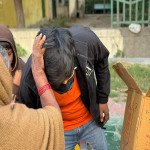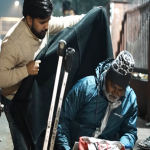The COVID-19 pandemic has undoubtedly been one of the most challenging crises in modern history. Its effects have rippled across every facet of life, impacting not only health but also economies, communities, and daily routines. In India, where millions live in rural and underserved areas, the pandemic placed an even heavier burden on vulnerable populations. At a time when people needed help more than ever, the Shivam Thakur Foundation (STF), led by Shivam Thakur, a renowned international pistol shooter, took swift action to support those in need.
While Shivam is known for his sporting achievements, his dedication to making a difference off the field is what drives the Shivam Thakur Foundation. During the pandemic, STF’s commitment to improving the lives of marginalized communities was put to the test. As the crisis deepened, the foundation mobilized its resources, collaborated with local authorities, and reached out to the most vulnerable families to provide relief. Here’s a closer look at how STF made a tangible difference during the COVID-19 pandemic.
The Immediate Impact of COVID-19 in Rural and Vulnerable Communities
When the pandemic struck, India faced immediate and unprecedented challenges. The country went into lockdown, and for many families, especially those in rural and marginalized areas, the consequences were dire. Daily wage workers, migrant laborers, and small-scale farmers who depended on their income to feed their families were suddenly without work. The situation was made worse by supply chain disruptions, which led to scarcity in essential goods, including food and medicines.
The Shivam Thakur Foundation quickly recognized the severity of the situation and jumped into action. The foundation was determined to help ease the suffering of these vulnerable communities by addressing both their immediate needs and longer-term challenges.
STF’s Disaster Relief Efforts: Immediate Response to the Crisis
1. Providing Food and Essentials to Needy Families
One of the most pressing issues at the onset of the COVID-19 pandemic was food insecurity. With daily wages and incomes lost, many families found themselves struggling to put food on the table. The Shivam Thakur Foundation quickly rolled out an emergency food relief program. STF distributed food packages to thousands of families in rural and underprivileged areas, ensuring that essential supplies reached the most vulnerable.
These food packages were carefully designed to provide balanced nutrition, including rice, lentils, flour, vegetables, cooking oil, and spices. The goal was not only to alleviate hunger but to make sure that people had the nutrients they needed to stay healthy during the pandemic. This distribution program reached some of the most remote corners of the country, where access to food and supplies was limited.
2. Providing Hygiene Kits to Prevent the Spread of COVID-19
During the pandemic, maintaining hygiene became critical in preventing the spread of the virus. However, in rural areas, many families did not have access to basic hygiene products like masks, soaps, or hand sanitizers. The Shivam Thakur Foundation took it upon itself to address this gap by distributing hygiene kits to families in need.
These kits included essential items such as face masks, hand sanitizers, soaps, and disinfectants, which are crucial for preventing the spread of COVID-19. STF’s volunteers worked tirelessly to ensure that these kits reached the doorsteps of vulnerable families, educating them about the importance of hygiene and following the recommended guidelines to stay safe.
3. Supporting Migrant Workers and Stranded Families
One of the most heartbreaking aspects of the COVID-19 crisis in India was the plight of migrant workers. With the sudden lockdown in place, millions of migrant laborers were stranded in cities, with no way to return to their villages. Many were forced to walk long distances to reach home, enduring hunger, exhaustion, and fear along the way.
The Shivam Thakur Foundation recognized the urgency of the situation and worked tirelessly to provide relief to these workers. STF helped arrange transportation for migrant workers to return to their villages safely, coordinating with local authorities and NGOs to ensure safe travel. In addition, STF provided food, water, and medical support to those on their way home, offering much-needed comfort and care during a time of uncertainty.
4. Healthcare Support and Awareness Campaigns
The COVID-19 pandemic posed a massive strain on India’s healthcare system, particularly in rural areas where healthcare facilities were already limited. The Shivam Thakur Foundation understood that supporting health during the pandemic was just as important as providing food and essentials.
STF launched awareness campaigns to educate communities about COVID-19 prevention. These campaigns were aimed at informing people about the symptoms of the virus, the importance of social distancing, and how to protect themselves and others from infection. Volunteers from the foundation went door-to-door in villages, distributing informational pamphlets and talking to families about the importance of staying safe.
In addition to awareness campaigns, the foundation collaborated with healthcare professionals to provide essential medical supplies, such as masks, thermometers, and medicines, to underserved communities. STF also organized mobile health camps in rural areas, offering medical consultations, treatments, and basic healthcare services to families who did not have access to medical facilities.
While the foundation’s immediate relief efforts were essential in the early days of the pandemic, STF’s vision extends beyond crisis management. As the pandemic continued, the Shivam Thakur Foundation worked on building long-term resilience in the communities it served. The foundation focused on creating awareness around sustainable health practices, boosting local economies through skill development programs, and empowering women and youth with the resources needed to rebuild and thrive.
In the aftermath of COVID-19, STF is also working on strengthening disaster preparedness in rural communities, ensuring that they are better equipped to handle future crises, be it health-related or natural disasters.





